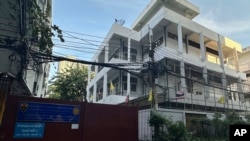The plight of 48 Uyghur detainees in Thailand has drawn international scrutiny as the group’s hunger strike protesting their possible return to China stretches into day 15 with the U.S. State Department, U.N. officials and activists voicing concern.
“By international human rights standards, such a prolonged hunger strike requires authorities to address grievances and ensure the detainees’ well-being,” said Rushan Abbas, executive director of the Campaign for Uyghurs and chairperson of the World Uyghur Congress executive committee.
The group of Uyghurs has been held in Bangkok’s Immigration Detention Centre since 2014, fleeing alleged persecution in China’s Xinjiang region. After more than a decade of detention there, their future remains precarious amid mounting calls for Thailand to uphold its human rights commitments.
US and Thai response
A U.S. State Department spokesperson told VOA late Thursday that Washington is “following this situation closely” and “deeply concerned by the reports.”
The spokesperson told VOA that the United States is engaging with the Royal Thai Government on the matter.
“We continue to urge the Royal Thai Government to respect the principle of nonrefoulement and to uphold its respective nonrefoulment obligations under international law,” the spokesperson said. “As Secretary [of State Marco] Rubio indicated during his confirmation hearing, he is prepared to use diplomacy and leverage the longstanding U.S.-Thailand alliance to engage the Royal Thai Government on the reported imminent repatriation of Uyghur detainees to China.”
At a press conference on Friday, Thailand’s Foreign Ministry said “no decision has been made” regarding the Uyghur detainees.
“Any decision on this matter will be based on relevant domestic legal frameworks, human rights principles, especially the principle of nonrefoulement, including Thailand’s obligation to refrain from returning people to where they will face torture or enforced disappearance,” said Nikorndej Balankura, the ministry’s director general of information. “For the time being no decision has been made. I can assure their safety.”
Advocates sound alarm
Despite assurances from Thai officials, human rights advocates remain skeptical, warning of the severe consequences if the Uyghur detainees are repatriated to China.
The 48 men, arrested in 2014 alongside over 300 other Uyghurs attempting to cross into Malaysia via human trafficking routes from China’s Yunnan province, have been detained in Thailand for more than a decade.
In 2015, 109 of the Uyghurs were forcibly deported to China, sparking international outrage. Their fates are unknown.
Meanwhile, 173 women and children were resettled in Turkey. Five detainees, including two children, have died since 2014.
Abbas expressed alarm over the uncertain future of the Uyghur detainees, drawing a parallel to the "devastating precedent" set in 2015.
“These 48 men could face the same dark fate as those deported nearly a decade ago. The Thai government must not repeat the mistakes of 2015,” Abbas said. “At that time, despite making similar assurances as today’s, Thai authorities sent 109 Uyghur men to China. They likely disappeared into the black hole of a regime infamous for torture and genocide.”
Abbas also cited concerns that the deportations could occur imminently, possibly before the Thai prime minister’s scheduled visit to China on Feb. 4.
“It seems they are trying to gain leverage from China by acting before the visit,” she told VOA in a phone interview.
The stakes in 2025, Abbas emphasized, are even higher than in 2015.
“If Thailand chooses to deport these Uyghurs despite the U.S. genocide determination and the U.N. finding of crimes against humanity, it would be a grave violation of international law and an affront to the principles of human rights,” she said. “Thailand should prepare for a tsunami of condemnation and face severe economic and political consequences.”
In 2021, the U.S. formally designated China’s treatment of the Uyghurs as genocide, and in a 2022 report, the U.N. human rights office stated that China’s actions in Xinjiang may amount to crimes against humanity, including torture, forced labor and forced sterilization.
China’s response
China has repeatedly denied the U.N. and U.S. determinations of genocide, asserting that its actions in Xinjiang are aimed at combating separatism, extremism and terrorism — what Beijing refers to as the “three evils.”
The Chinese Embassy in Bangkok weighed in last Wednesday, alleging the Uyghur detainees had terrorist affiliations.
"A small number of individuals, enticed by external forces, fled abroad and even joined the 'East Turkestan Islamic Movement' [ETIM], a terrorist organization recognized by the United Nations, becoming terrorists themselves," the embassy stated on its website.
However, the narrative surrounding ETIM has evolved. While the group was designated a terrorist organization by the U.N. in 2002, the U.S. delisted it in 2020. A report by the Congressional Research Service at the time cited a lack of "clear and convincing evidence of ETIM's existence."
Health deterioration
According to U.N. experts, the detainees’ health is rapidly deteriorating. In a statement earlier this week, they said 23 of the 48 suffer from serious health conditions, including diabetes, kidney disfunction, lower body paralysis, skin diseases, gastrointestinal illnesses, and heart and lung conditions.
“It is essential they be provided with the necessary and appropriate medical care,” the report said.
U.S. Representative Gregory Meeks, ranking member of the U.S. House Foreign Affairs Committee, issued a statement on Wednesday condemning any potential deportation.
“If these Uyghurs are deported back to the PRC, Thailand would be violating the customary practice of nonrefoulement and its commitments as State Party to the UN Convention against Torture and Other Cruel, Inhuman or Degrading Treatment or Punishment,” he said, using the acronym for China’s official name, the People’s Republic of China.
Meeks called on the Thai government to guarantee the detainees' protection, provide them with access to asylum procedures and ensure they receive the medical care they need.
Nike Ching and Rattaphol Onsanit contributed to this report.
